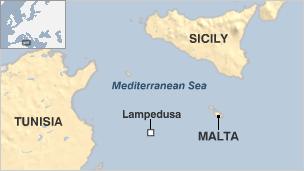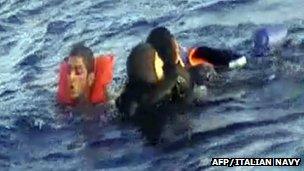Migrant boat capsize survivor tells of ordeal
- Published
Watch: Matthew Price reports on the victims of the capsize, including one family forced to choose which of their children to save
A survivor from the boat crowded with migrants that capsized in the Mediterranean on Friday has spoken of the panic on board as the vessel began to take on water.
The man, who did not want to be identified but gave his name as Abde, told the BBC that he and his fellow passengers were in the water for more than an hour waiting to be rescued.
Now in a detention centre on the Italian island of Lampedusa, Abde said he was originally from a Palestinian refugee camp in the Syrian capital, Damascus, and had fled the unrest there.
He said he travelled first to Egypt and then to Libya where he paid a smuggler to take him - together with his brother and uncle - to Italy.
Their ultimate destination, he says, was Sweden where he has relatives.
"It was Thursday night when we got out," he told the BBC.
"They put us on the beach. We waited there until nightfall."
He said those waiting had been told the boat was strong, but when they were ferried out to it they discovered it was "wooden and small".

"We saw it but it was too late, we had no home any more."
The boat was fired upon shortly after beginning its journey, Abde said. Those shooting were from the Libyan coast guard, he claimed, although other witnesses have blamed Libyan militias or traffickers.
"When we got out in the international waters, they came after us and shot some fires in the air and we kept moving. When we got inside the Italian waters, they lost hope and started shooting us with live rounds.
"They shot two of the skippers. Some of the women got shot. The last thing they shot the engine room in the bottom of the boat and that's when the water started to get inside the ship."
Abde said those on the boat had tried to block the bullet holes, but the pressure of the sea-water was too strong. The boat was leaking badly and by the time it got close to Lampedusa, waves started to drag it towards Malta.
He said the captain looked as though he was lost.
"The ship started to be filled with water and started to lose balance," said Abde.
"The girls started screaming they would die (and asked) 'Please call the Red Cross'.
"We called the Italian Red Cross and they told us we were in Maltese regional waters. We called the Red Cross in Malta and they told us they would come to us in a while. We asked how much time and they said about 40 minutes or 30 minutes.
"They sent a plane before the ship sank. It flew over us and filmed us. So we said, now we are sure they saw us and are aware of us.
"The waves got really high and the boat lost balance, filled with water in the bottom. People got really scared."
Abde said a large wave made the boat lean far to one side and passengers tried to compensate by moving to the other side.

Video images captured the moment these survivors were rescued
"The boat leaned to the right side, and with everyone already on the right side the boat capsized," he said.
"People got life jackets on and were waiting for rescue. After we were in the water the waves separated people from each other. I could see people swimming for about half an hour to reach each other. We remained for about an hour, or an hour and a half, in the water."
He added: "The Red Cross came to save us, they saved who was still alive. I hope this never happens again. Women and children were among the dead."
Malta and Italy launched a joint rescue operation on Friday, saving scores of people from the sea and taking them to Lampedusa or Malta.
Abde believes his brother was taken to Malta but he has no news of his uncle.
The tragedy came a week after at least 300 migrants drowned when their boat sank off the coast of Lampedusa.
Tens of thousands of would-be migrants attempt the crossing from North Africa to Lampedusa, Sicily and other Italian islands each year.
Some EU states are now calling for a review of migration laws and more maritime patrols to try to prevent further loss of life.